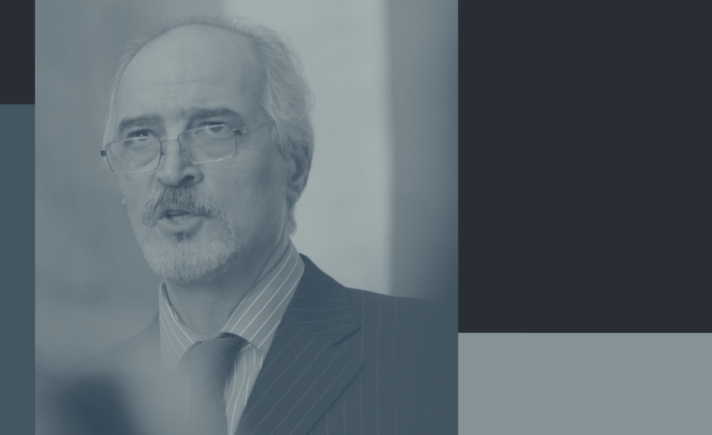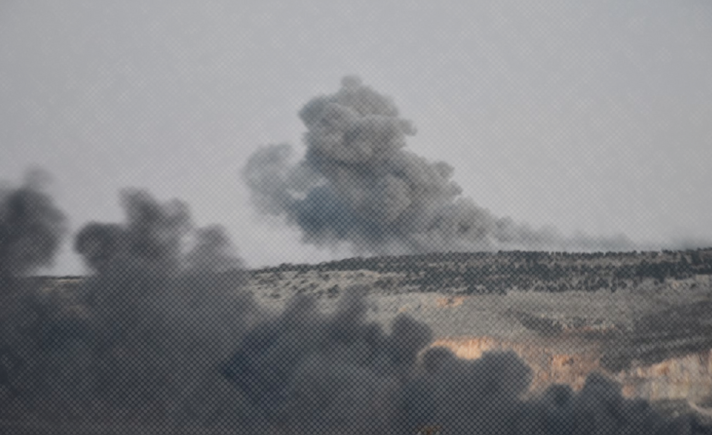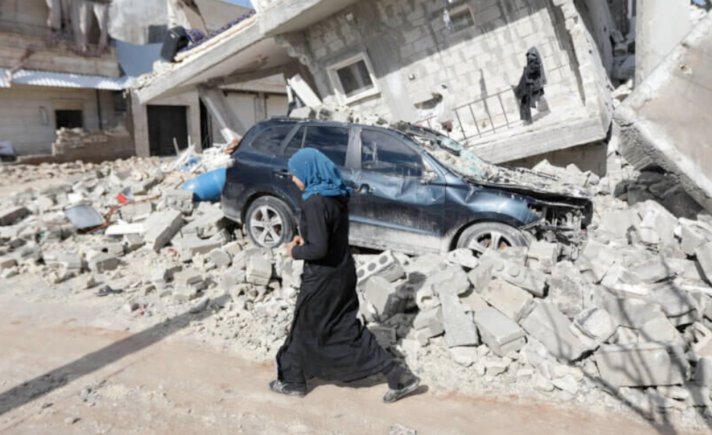When a young man at the prime of his age takes his own life in a fiery explosion, leaving behind his family and putting a horrific end to his life, many are flabbergasted by this act. On the part of the young man, however, he is rather concerned with their non-compliance with his organization’s leaders and emirs.
How does the Islamic State (IS) convince young people to join its ranks? What are the segments of society targeted by its recruitment and indoctrination? This piece attempts to analyze IS categorization of human society into states, a merchant class divided between loyalists or opponents to them, and the rest of the citizenry, who are referred to by the organization as “commoners.”
How does IS media discourse incite the “commoners” to challenge and undermine state authorities, and who are those excluded from IS recruitment efforts?
*****
In May of 2004, footage circulated depicting the former leader of Islamic State of Iraq (ISI), Abu Musab al-Zarqawi, giving a statement before slaughtering American hostage Nick Berg. Al-Zarqawi has since issued fatwas calling for the murder of Shiite civilians and targeting their markets in southern Iraqi provinces, and considering Shiite presence equivalent to the US occupation of the country. Since the surge of IS in Iraq, many observers have contemplated the identity of those affiliated with the organization, and how the rhetoric and vision of the organization has taken hold among the youths.
IS adopts a strategy aimed at the fragmentation of society into three categories: two independent categories in opposition of each other, and a third fluctuating between the two.
Governments
IS deems the ruling regimes in all Arab and non-Arab countries to be godless, considering that they do not rule in accordance to “what Allah has revealed,” citing the Quranic verse [5:44] “Unbelievers are those who do not rule according to God’s revelations.” Therefore, all states which are party to the UN, and signatories to international conventions and treaties, are deemed godless given their ultimate reference to positive laws, which also applies to Arab and Islamic countries.
This category includes the military, police, ministries and government institutions; all government employees are infidels in the eyes of the organization and its adherents. Drawing on the aforementioned verse, the organization dismisses as illegitimate all governments of the world, and in doing so, it appeals to and attracts the subjects of these governments.
In its rhetoric regarding the governments of the Arab and Islamic countries, IS primarily cites Quranic verses. As for non-Arab governments, it shifts its discourse, addressing instead corruption and internal crises these countries endure.
IS deems futile to preach to governments or seek their support. Unlike the rhetoric addressed to peoples, IS threatens state governments with explosions and militant operations, as was stated in the first statement by Abu Musab al-Zarqawi: “As for you, Bush, you Roman dog, you’d better be ready for something that’s going to hurt you bad. Get ready for hard times. You and your soldiers who trod Iraq’s land and dare to provoke Muslim fervor will regret it.”
The discourse of threatening governments and regimes with armed violence did not die with al-Zarqawi. Threats were resumed by each successive ISI leadership, from Abu Hamza al-Muhajir to former spokesman of the IS organization, Abu Mohammed al-Adnani.
Peoples
Once it stigmatized rulers as heretics, and outright threatened them, the organization obtained the means to bring down the prestige of states, or Abu Bakr Naji refers to it in The Management of Savagery, the stage of the power of vexation and exhaustion, which aims at eroding the prestige of states in the eyes of their citizens, be them Islamic or non-Islamic, by undermining their national security.
IS labels the peoples of Arab and Islamic, and even Western countries with the term “subjects” or “commoners,” addressing them from the position of a guardian or savior, each in their native tongue and according to the prevailing problems in their respective countries. It thus aims to sow discontent among these people towards their governments. An example of this practice can be found in al-Zarqawi’s aforementioned statement: “To you, the mothers and wives of these American soldiers, we say that we have offered the US administration to exchange this captive for some prisoners in Abu Ghraib, but they declined… We tell you that the dignity of Muslim men and women in Abu Ghraib prison and others shall be redeemed by blood and souls… You will not receive from us but coffin after coffin, all slaughtered in this way.”
Diversity in Rhetoric Directed at Peoples
In addition to its general discourse, and in order to mobilize more people and facilitate the travel of recruits, the organization produces media rhetoric that is specifically tailored to the conditions of people in each country. As it addresses Muslims in Egypt, for instance, IS agitates people against the Sisi regime by highlighting the peace agreement with the Zionist entity, but it applies different rhetoric and takes advantage of other issues and crises in Algeria.
As such, IS media discourse is deliberated and directed in the language of each country of interest, and takes its societal and political particularities into account. As Abu Musab al-Suri has clearly stated in Islamic Resistance: “We cannot mobilize the people of the Arabian Peninsula by appealing to their poverty or unemployment, but we can mobilize the people of Egypt using these means.”
Geography of the Masses
Observers of IS publications and media find that the organization, while propagating its narrative in different foreign languages, emphasizes specific countries and regions, prioritizing them according to their rate of recruitment.
The organization did not declare an Islamic caliphate after establishing presence in the Anbar desert in Iraq, although their requirements for such a declaration were met. Instead, they declared the caliphate only after they gained a foothold in Syria. Perhaps this was grounded in the hadith:
“From Abdullah ibn Hawala, the Messenger PBUH said: ‘You will be split up into groups of armies. An army will be in al-Shaam [the Levant], an army in Iraq, and an army in Yemen.’ Abdullah said: I stood up and said ‘choose for me, Messenger of Allah.’ The Prophet PBUH said: ‘Upon you is al-Shaam; and whoever cannot, let him go to Yemen, and let him drink from its water, for Allah has assured me of al-Shaam and its people.”
Thus, to appeal to the youths, IS references specific hadiths in which the Levant, i.e. Syria, Lebanon, Jordan and Palestine, is employed as a magnet. Hadiths which address the virtues of the people of al-Shaam, as well as the virtue of conducting jihad on these lands, have been sufficient to attract many Muslims from several countries. Furthermore, the Islamic caliphate it declared is where Muslims from downtrodden countries find their sole savior from the calamity the Islamic Ummah faces. The organization has also found in Yemen and Saudi Arabia a suitable geography to declare its caliphate, as well as an active magnet to attract Muslims from all over the world.
In his Strategic Memorandum, Abdullah bin Mohammed alludes to this tactic, through which the declaration of a caliphate cannot take place but in specific countries, chosen according to their religious significance, vital resources, rivers, oil fields and arable lands.
As for the targeted age groups, there is no specific category, as IS rhetoric targets both males and females from all age groups – albeit to varying degrees.The organization’s primary reliance is upon the generations that will grow up in its controlled territories, who are slowly transformed into ticking time bombs.
Analysts find that the organization, through its media arsenal, appeals to young people’s instincts. One would find video clips portraying Arabian horses, Arabian coffee, and the slaughter of a lamb near a river, all accompanied by Bedouin poetry. These messages seem to be directed at the youth in the Arabian Peninsula and Gulf states. Meanwhile, the organization publishes photos of cheap European cars granted free of charge to members of its ranks, mentioning that IS personnel do not receive traffic violation tickets. “Here, there are no financial taxes or banking interests,” as one of its recruiters once tweeted.
In addition, IS employs messaging and voice chats embedded in video games, such as Grand Theft Auto V, during which players are told that they can reenact what the characters do in the game in the real world, exactly as they occur in the game – as soon as they join the organization.
Moreover, IS finds in female-related discourse an effective weapon in its recruitment strategy. It utilizes chivalry, magnanimity towards one’s honor and women in Arab traditions, while citing in this regard verses of poetry:
“Woe onto my people,
How they forget Muslim virgins
Clad in humiliation in the prisons of Christians?”
“I yearned for your return,
Bearing banners in between your arms.
If, my brother, God wills it,
You shall be witnessed a martyr in Iraq”
“O’ people of my creed,
If only you’d see what the enemies have done
To a girl whose prophet was God’s finest creation.”
Observers find almost no prisoner swaps in which a female name was ever included. In early 2014, however, the organization waged a militant campaign, led by its Emir of War Abu Omar al-Shishani, in which it mobilized large numbers of fighters under the slogan “Revenge for Our Chaste Women,” trying to win over the emotions of Syrian civilians by alleging rape by rebels of some muhajiraat (non-Syrian female jihadists).
Conversely, women are an effective weapon in the opposite manner, i.e. through the use of captives as sex slaves, as was the infamous case of Yazidi female prisoners. The organization uses such cases to attract young men who believe in its legitimacy, especially in light of deteriorating economic conditions which constitute an impediment to marriage.
Capitalists
From the standpoint of “commoners,” owners of capital differ little from the rulers. As for the organization itself, however, it takes advantage of some of those and disposes of others. It does not offer clear and consistent discourse in their regard, as it attempts to co-opt some of them in the same manner it addresses common folk, while deeming others to be infidels and maintaining hostility towards them.
Capital is the foundation of any organization or militia. As Abdullah bin Mohammed puts it in The Strategic Memorandum, a caliphate cannot be declared without prior knowledge of its sources of funding and the extent of its sustainability. IS may therefore appeal to some capital and property owners as a matter of common interest, taking advantage of their presence for the sale of oil and agricultural products in both Syria and Iraq, as well as signing partnership contracts with international companies with interests in its areas of control. Notably, documents obtained by Zaman al-Wasl news website revealed that there were communications between the French company Lafarge and IS, mediated by local businessmen.
Conclusion
The Islamic State organization has benefited from the “mistakes” made by the Taliban regime and other Islamist groups and parties in the world, who “implicated themselves,” as IS expresses it, when they sought international legitimation and recognition.
This organization cannot possibly seek to obtain international recognition, although this could remain one of its long-term plans. As journalist John Cantlie, who was abducted by IS, put it in an article published in the organization’s official magazine Dabeq: “The Islamic State may be recognized in twenty years, which is the period of time which took the United States to recognize the Soviet Union.”
Non-recognition of the organization’s State, and its own abstinence from seeking such recognition, grants it popularity among those oppressed by their governments. In this pursuit, it fragments society into different categories, kills some to gain credibility among others, and thus “manages savagery” in this world.








